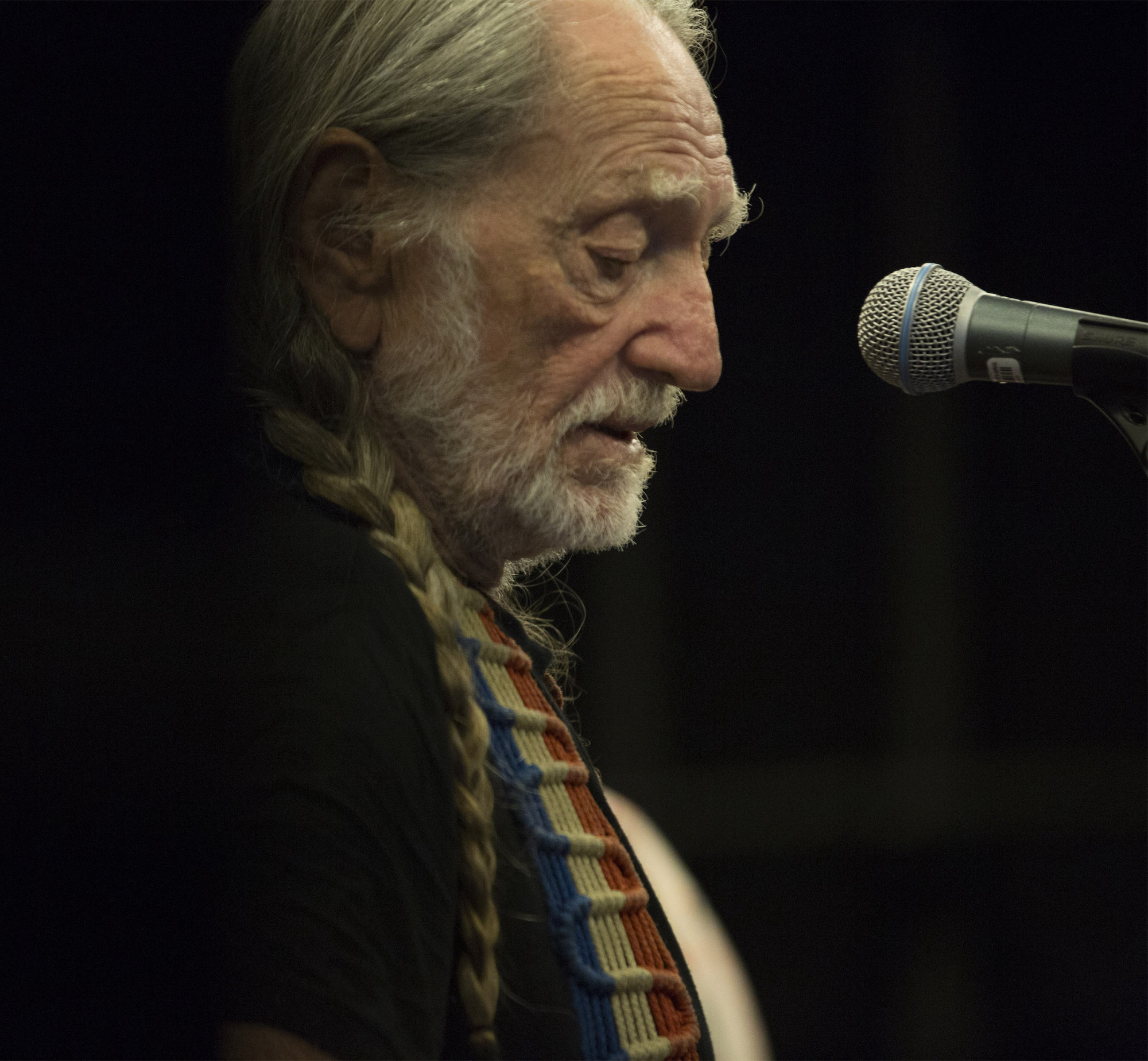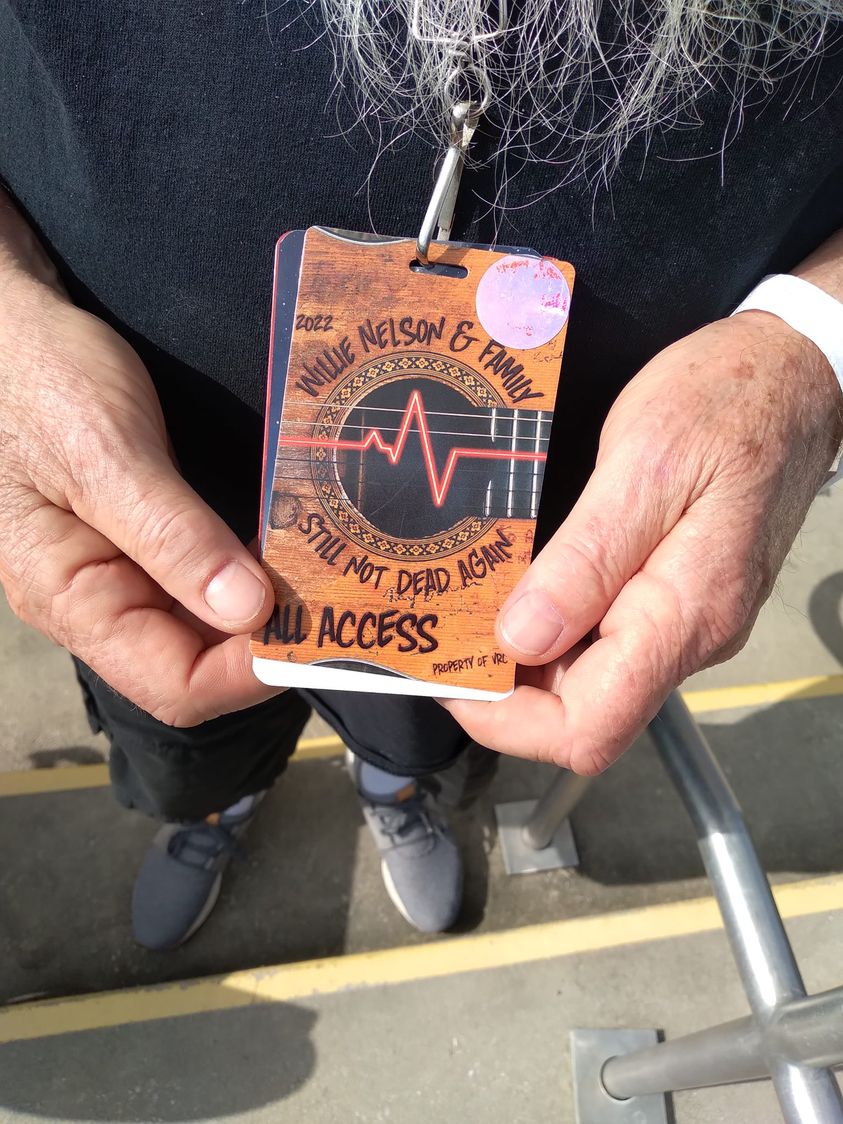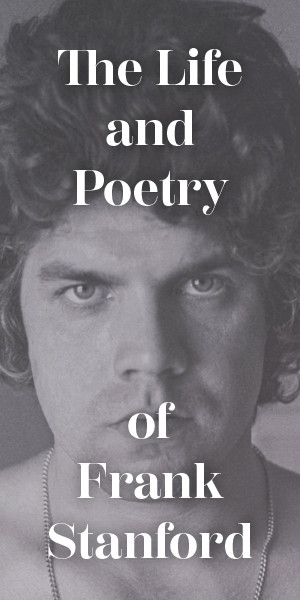Roll Me Up and Smoke Me When I Die
Willie Nelson can’t go on forever. Or can he?
By David Kirby

Photograph by James Minchin
I was in St. Peter’s Square in Rome last year when the pope and Willie Nelson stepped out onto the balcony of the papal residence. An old Italian lady in a black sweater tugged on my arm and said, “There’s somebody up there I don’t recognize.” “Really?” I said, and she said, “Yeah, who’s that with Willie Nelson?”
Okay, okay. The point is, everybody knows Willie Nelson, meaning they either know-know him (that would be his actual acquaintances) or have seen him perform live or on TV (the rest of us). For sure, everybody has a Willie story, even if they didn’t get it firsthand. Willie’s been around too long, lived too colorful a life, been interviewed too often, and cowritten enough nonfiction of his own (most recently It’s a Long Story: My Life with David Ritz) to not be more talked about than almost anyone else, in showbiz or not.
Anyway, March 4th was country night in Tallahassee: Willie was appearing at the beautiful outdoor Adderley Amphitheater, named for jazz greats Julian and Nat Adderley, while silver-haired diva Emmylou Harris was at a Florida State University concert hall just five minutes away. Some coin toss! But as Emmylou is a young thing of seventy-three, I decided to go with Willie, who will be ninety next month. He can’t go on forever.
I hope he goes on forever.
The afternoon of the show, I stopped by the venue to eavesdrop on the band’s line check and see if I could find a colorful character to talk to. Sure enough, five minutes later I found myself swapping chuckles and stories with Budrock, a.k.a Budrock the Illuminator (that’s his Instagram handle), a stocky and white-bearded figure who works as Willie’s light man. Given the singer’s professed love of golf, the first thing I asked is whether he was getting in eighteen holes on this cool sunny day, but Budrock, who is a mere pup of seventy-three, said that, while he and Willie used to play whenever weather permitted, back problems have put an end to that. “Besides,” he said, “all our golfing buddies are up there” and pointed skyward.
“Right now Willie’s probably putting his feet up,” said Budrock, nodding toward the Honeysuckle Rose, Willie’s tour bus that once featured colorful Western paintings on its exterior but is now decorated in bland shades of cream and ochre for privacy. (“Before it was as visible as Air Force One,” Scott Carswell, the event’s promoter, told me earlier.) I wanted to find out how anyone, much less someone who has lived a life as action-packed as Willie’s, gets to be a month away from ninety, so I asked what he was doing to take care of himself. “Oh, he still does the taekwondo,” said Budrock, “and he’s got a speed bag on the bus he punches from time to time,” raising his fists over his head and punching an imaginary speed bag of his own.
I mentioned that I’d heard that symphony conductors are notoriously long-lived because, first, as opposed to more stressful lives, theirs is a rewarding career in the arts, and second, they take a couple of hours of moderate exercise most days, and here I did my impression of a conductor waving a baton with one hand and giving prompts with the other. “Well, Willie strums every day,” said Budrock. “Main thing is, he just can’t stay still. Anyway, he’s doing fine.”
Yet if I’m thinking about how old Willie is, you can bet Willie’s thinking about it a lot more than I am. He’s the one who labeled his 2022 tour “Still Not Dead Again” (Budrock showed me the pass for that tour, which he wore on a lanyard around his neck with passes from a dozen others). The light man started to walk away, but he paused to smile over his shoulder and say, “You better hope he’s OK, right? Showtime’s at nine—if he doesn’t last another seven hours, you’re going to be out of a paycheck.”

Budrock's "Still Not Dead Again" tour pass. Photo courtesy the author
Not a problem. After a couple of warm-up acts, Willie stepped on stage at nine sharp and took a seat up front and plugged in his famously battered acoustic guitar Trigger. To his left sat his son Micah, thirty-two, also playing amplified acoustic, accompanied by three more musicians: a bass and a harmonica player and a drummer with only a snare drum and a pair of brushes.
The five players launched immediately into “Whiskey River,” followed by “Still Is Still Moving to Me” and “Move It On Over.” It was at about this point in the evening that I began to see a striking difference between this show and the last time I’d seen Willie here in Tallahassee, which was exactly twenty years earlier. In 2003, Willie had a full band. He moved around the stage more, throwing bandanas into the crowd, flashing his cherubic grin, picking out different audience members and wiggling his fingers at them like a rascally uncle. Yet the song selections then were often down-tempo, minor-chord numbers like “Blue Skies” and “Funny How Time Slips Away.”
In contrast, tonight’s choices were more up-tempo and often sidesplittingly funny. He did Billy Joe Shaver’s “Georgia on a Fast Train,” a nose-thumbing putdown of folks who think they’re better than you are. He sang the song that I’ve used for the title of this article as well as Mac Davis’s “It’s Hard to Be Humble” and “Everything Is Bullshit,” a punk-country song by Micah (who performs on his own as Particle Kid) and “Write Your Own Songs,” a comic diatribe directed at predatory music executives. Willie stayed seated throughout the set; if it seemed as though he needed a rest, instead of stepping offstage for a couple of numbers or segueing to a slow-song interlude as many other artists do, he passed the lead to Micah.
Who more than held his own: a lot of musicians bring their offspring along when they tour, but the term nepotism didn’t come to mind here. Micah Nelson played his guitar with the same skill, driving intensity, and range across the various genres (country, sure, but also jazz, pop, blues) as his dad.
And his songwriting chops are right up there as well. At one point Micah said he was playing dominoes with his dad a couple of years ago when Willie pointed to the sky and said, “If I die when I’m high, I’ll be halfway to heaven.” Micah’s response was, “Dad, that’s the best song title I ever heard. You better write the rest of it quick. But he said, ‘Why don’t you write it?’” said Micah, “so I did.”
The two men then did “Die When I’m High (Halfway To Heaven),” which the Whiskey Riff website calls “the most Willie Nelson song ever,” with Micah banging out an instrumental bridge as good as any of his dad’s. Beethoven is supposed to have said that a guitar is a “miniature orchestra,” and both men’s skills bear that out. Micah’s millennial voice doesn’t sound like his father’s, but whose does?
Speaking of which, during the 2003 show, Willie was as animated as any seventy-year-old in fighting trim, whereas tonight he never budged from his chair and looked largely stoical, even grave. Yet his voice was the voice you’ve always heard. It still cuts like a welder’s touch, one sculpting arcs in the air, beautiful imaginings of laughter and longing, of ends not yet and never to be attained.
Earlier that evening a crew member who didn’t want to be identified said Willie used an oxygen tank for his emphysema but didn’t want anyone to see him with it. His pot use is, of course, legendary. Mike Ferrara, a restaurateur who served more than one meal to Willie during his last visit to Tallahassee, told me he made his way onto the Honeysuckle Rose and spent several hours there without ever taking a direct toke, and as might be expected, he staggered off the bus later as high as he’d ever been just from inhaling the psychoactive atmosphere. Tonight there was no sign of weakness in Willie’s sublime voice, though. As an eighty-nine-year-old, he doesn’t look a day over eighty-eight. Weak lungs or not, he still sings like an angel.
So where does all this damned joie de vivre come from? I have lunch from time to time with older friends, and most of them strike me as a lot happier than many of the younger people I know. Their health is fine in a so-far-so-good way, their children are grown up and taking of care of themselves, their finances are solid. (Willie has a net worth of $25 million, according to a recent article in Parade, so he’s more than OK in that department.)
But there’s more to it than that. In 2010 I saw B. B. King in the concert hall where Emmylou Harris is performing tonight. It wasn’t pretty. For an hour he churned out the hits, but he spent the last twenty minutes of the show sitting with his legs hanging over the edge of the stage and grousing about his enemies while his musicians looked embarrassed.
In contrast, as I watched Willie tonight and listened to the crowd roar, I found myself thinking of jazz great Wayne Shorter, also eighty-nine, who died the week before Willie came to town. The New York Times obituary of composer and saxophonist Shorter noted that “in his later years, he cut the figure of a sage with a twinkle in his eye.” Not only that, he kept reinventing himself, releasing at age eighty-five a suite called Emanon that received broad critical acclaim, topping more than one album-of-the-year list.
Same with Willie. Some musicians just fade away, some never change, and some manage to rediscover the joy that launched them in the first place. Willie's still writing, often co-writing songs with Micah and others. As the 2003 and 2023 concerts show, he changes his playlists instead of cranking out nothing but golden oldies, as many older artists do. He collaborates and has collaborated with everybody from country peers like Dolly Parton to Ray Charles and Bob Dylan. He even worked with Snoop Dogg on “Roll Me Up and Smoke Me When I Die,” although, given their mutual allegiance to a celebrated narcotic, maybe this sentence doesn’t even need the “even” in it.
In the end, what makes Willie Willie? He’s not Merle or Waylon, and he’s certainly not Johnny Paycheck or David Allan Coe, and he’s not even Johnny Cash, who appealed to all America but mainly because he represented a bygone culture’s best. Johnny was an unembroidered amalgam of manners, manhood, and traditional values tempered by kindness, meaning he was country but in an old-school way. Willie’s more than that. Willie is everything, and that’s why so many know and adore him. He’s the love child of Bob Marley and Santa Claus. Willie is everybody’s pothead grandpa who transcends time and region.
And maybe age, even: nothing would make me happier than to be passed on the interstate a couple of years from now by a cream-and-ochre tour bus and hearing from inside the thrums of somebody punching a speed bag.
When the show ended tonight, it was over. Unlike the other times I’ve seen Willie, there was no encore; the man got up, smiled and waved, and left. Clearly Willie is managing his strength and energy and managing them well. He knows he’s going to be ninety. He hopes he’s still doing this when he’s ninety-one, and I do, too.
The concert had ended with a couple of hot-steppers that underscored the vivacity of the whole show, “Will the Circle be Unbroken” and “I’ll Fly Away.” But to me the song of the night was “Still Is Still Moving to Me,” a lesser-known piece that begins with a frenetic Django-Reinhardt-style intro that would make dead people dance. With the allusiveness but also the duende of a Lorca poem, the lyrics intimate that life is short, but while we still have it, life is about freedom, and freedom means staying in motion.
As Budrock the Illuminator said, the man can’t stand still.




